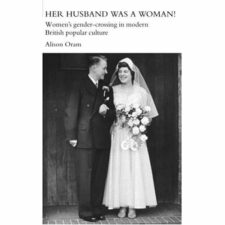Today, Thursday, 25th November 2010, sees the launch of 16 Days of Action to Eliminate Violence Against Women. Events are planned worldwide to increase awareness of this pressing problem, which continues to require immediate attention and intervention today. My own research, which looks at marital breakdown in late twentieth-century Scotland, examines the issue of domestic abuse from a feminist perspective. The available statistics on contemporary domestic abuse remain shocking. In 2008, 10,882 domestic abuse incidents were recorded by police in Glasgow, yet women experiencing domestic abuse are, on average, assaulted 35 times before they make initial contact with the police. In Britain, two women lose their lives at the hands of a current or former male partner every week.
The oral testimony and archival evidence I have gathered in the course of my research has highlighted for me not only the seriousness and historical scale of this issue but, equally, the contemporary importance of campaigns such as ‘16 Days’. Such campaigns provoke mainstream discussion of the issue of violence against women and also help to open up the necessary channels of communication, so that women might more readily disclose their own experience to others and get the help they need. Historically, even into the late twentieth century, domestic violence remained a largely ‘hidden’ problem, intensifying the extreme isolation many women felt and reinforcing their reluctance to speak out.
In their contemporary study of domestic violence in 1970s Scotland, the Dobashes portrayed a thoroughly patriarchal society, emphasising in particular the significance of the ‘legal, political, cultural, family, and economic institutions’ in which male dominance had been enshrined and which continued to underpin the prevailing social culture. Highly gendered discourse and ideologies similarly operated to preserve the patriarchal status quo and conditioned women’s own responses to their experience of domestic violence. Many women attempted to hide from their close family and friends the extent and nature of the frequently very serious violence which they experienced within the home. These efforts to ‘cover up’ domestic violence often arose out of a highly complex range of feelings. Many women felt personally responsible for the success, or otherwise, of their marriage, however abhorrently their husbands behaved. The idea that the nature of one’s marital relationship was a thoroughly private matter further inhibited women experiencing domestic violence from speaking out about abuse.
In recent years, growing recognition of domestic violence as entirely unacceptable and highly damaging has permitted women to more readily speak out about the abuse they have endured and to seek support both for themselves and for their children. Whilst my research has uncovered some disturbing continuities in attitudes surrounding violence against women, it has also illuminated the extent to which many women felt empowered on leaving their abusive partners and being able to discuss openly, very often for the first time, their own personal experiences of domestic abuse.
Margaret, one of my interviewees, described the visible change she could detect in women who had entered refuge in order to escape abuse within the home. These women became ‘different people! Uh-huh. Some people come into the refuge and, you know, after … maybe a few weeks or a couple of months or a few months, they’re like totally [changed], they get their self-esteem and their self-confidence and they’re like different people. You don’t recognize them!’ Another respondent, Christine, related her own personal experience and sense of strength after asking her violent husband to leave the home she shared with their young children:
I just felt so positive, that the mistakes now would be my mistakes. I was fed-up clearing up all [his behaviour] … [It] was brilliant cause he left in June and our house was to be renovated, so everything went into storage, and then, em, we got a new house back. So that was really good, I just thought, I’ll build this house and I’ll make the mistakes now, and they’ll be mine, and we’ll see. And, eh, yeah, it just all seemed to work out well.
Discussing the fundamental contribution of support group Women’s Aid, Margaret emphasised the importance of making women aware of the options they have and providing them with the support and space they require in which to make their own informed choices:
Everybody’s different and some women take longer than others to give up and say, and realise he’s never gonnae change, so you’ve always got to be non-judgmental in giving women their choices, to be sure about what they’re doing, because your options, you know – It’s not easy, the other options are bringing your children up on your own, or even if you’re a single woman on your own, isn’t an easy path to take. So they’ve got to be sure in themselves, to be strong enough, to do it, and sometimes that takes a wee while for women to come [to that point] but the important thing is, giving them [the] opportunity for them to realize it themselves.
Campaigns such as ’16 Days’ constitute as essential force in ‘giving women the opportunity’ to assert their experiences and concerns and, similarly important, to give a voice to women who are suffering violence around the world. The duration of the campaign, which ends on Friday 10th December 2010, International Human Rights Day, specifically reflects the relationship between violence against women and the violation of human rights. Undertaking research in this field has powerfully illuminated this relationship for me and has also reinforced my commitment to the continuing struggle against violence against women.
Click on the links for more information on domestic violence and help: Scottish Women’s Aid, Women’s Aid, and Refuge. Please also consider giving to Women’s Aid, Refuge and to the local branches of Women’s Aid and Refuge (find your local branch through the links above). Like many charities, the current economic climate has seen cuts to budgets with a consequent impact on services- your giving can help.
Further Reading
Glasgow Community Safety Partnership, 2009
R. E. Dobash and R. Dobash, Violence against wives: a case against the patriarchy. London: Open Books (1979).

